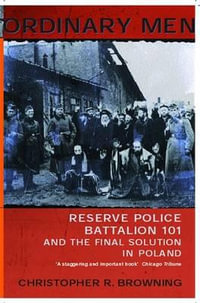-[Berger] aims to integrate the study of the Holocaust into the wider sociological study of genocide, and the way such events are handled and remembered. He does this largely though a distillation of some of the principal contributions (mostly by historians) to the study of the Holocaust. The author is particularly interested in the question of why the Jews were singled out by the Nazis. This then becomes the basis for tracing the impact of the Holocaust on historical memory not just among Jews in Israel, but also among others, such as non-Jewish Poles, Germans, and Americans... [A] compact, useful study... Recommended.-
--K. Kumar, Choice
-In a work of careful synthetic scholarship that can be read at the same time as a profound meditation on the Holocaust and the politics of memory, Ronald Berger provides a characteristically insightful and compelling account. The book's wide-ranging agenda moves deftly from exploring the deep history of anti-Semitism and the more contingent elements of twentieth-century Germany to subsequent attempts to make sense of the competing explanations for this traumatic historical experience. As such, he is committed to a project his disciplinary peers have generally been hesitant to develop: a sociology of evil. Moving past the event, Berger traces the emergence of the varied expressions of collective remembrance once the social amnesia characteristic of the immediate postwar period had passed. Without ever forgetting the uniqueness of the Jewish encounter with evil, Berger is intent on encouraging readers to seek out the universal significance of this particular trauma by linking it to more recent genocides--and in so doing, attempting to encourage the creation of bonds of solidarity with all those who suffer at the hands of oppressors.-
--Peter Kivisto, Augustana College and University of Turku
"[Berger] aims to integrate the study of the Holocaust into the wider sociological study of genocide, and the way such events are handled and remembered. He does this largely though a distillation of some of the principal contributions (mostly by historians) to the study of the Holocaust. The author is particularly interested in the question of why the Jews were singled out by the Nazis. This then becomes the basis for tracing the impact of the Holocaust on historical memory not just among Jews in Israel, but also among others, such as non-Jewish Poles, Germans, and Americans... [A] compact, useful study... Recommended."
--K. Kumar, Choice
"In a work of careful synthetic scholarship that can be read at the same time as a profound meditation on the Holocaust and the politics of memory, Ronald Berger provides a characteristically insightful and compelling account. The book's wide-ranging agenda moves deftly from exploring the deep history of anti-Semitism and the more contingent elements of twentieth-century Germany to subsequent attempts to make sense of the competing explanations for this traumatic historical experience. As such, he is committed to a project his disciplinary peers have generally been hesitant to develop: a sociology of evil. Moving past the event, Berger traces the emergence of the varied expressions of collective remembrance once the social amnesia characteristic of the immediate postwar period had passed. Without ever forgetting the uniqueness of the Jewish encounter with evil, Berger is intent on encouraging readers to seek out the universal significance of this particular trauma by linking it to more recent genocides--and in so doing, attempting to encourage the creation of bonds of solidarity with all those who suffer at the hands of oppressors."
--Peter Kivisto, Augustana College and University of Turku
"[Berger] aims to integrate the study of the Holocaust into the wider sociological study of genocide, and the way such events are handled and remembered. He does this largely though a distillation of some of the principal contributions (mostly by historians) to the study of the Holocaust. The author is particularly interested in the question of why the Jews were singled out by the Nazis. This then becomes the basis for tracing the impact of the Holocaust on historical memory not just among Jews in Israel, but also among others, such as non-Jewish Poles, Germans, and Americans... [A] compact, useful study... Recommended."
--K. Kumar, Choice
"In a work of careful synthetic scholarship that can be read at the same time as a profound meditation on the Holocaust and the politics of memory, Ronald Berger provides a characteristically insightful and compelling account. The book's wide-ranging agenda moves deftly from exploring the deep history of anti-Semitism and the more contingent elements of twentieth-century Germany to subsequent attempts to make sense of the competing explanations for this traumatic historical experience. As such, he is committed to a project his disciplinary peers have generally been hesitant to develop: a sociology of evil. Moving past the event, Berger traces the emergence of the varied expressions of collective remembrance once the social amnesia characteristic of the immediate postwar period had passed. Without ever forgetting the uniqueness of the Jewish encounter with evil, Berger is intent on encouraging readers to seek out the universal significance of this particular trauma by linking it to more recent genocides--and in so doing, attempting to encourage the creation of bonds of solidarity with all those who suffer at the hands of oppressors."
--Peter Kivisto, Augustana College and University of Turku
























